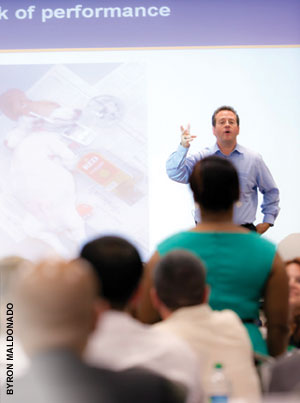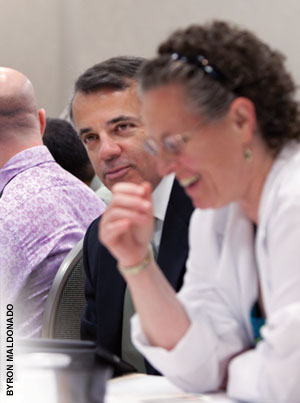Leadership Development Institute
Trains Leaders
in Best Practices
By Dwayne Campbell
Quarterly Leadership Development Institute
forums for about 500
UHealth managers
are vital for learning UCare
tools and techniques.
 |
| Bob Murphy of the Studer Group leads a UHealth Leadership Development Institute session. |
During peak times it once took some patients as much as 40 minutes to register at Sylvester Comprehensive Cancer Center. Now it takes most of them five minutes.
How to account for such a remarkable turnaround? Standing nervously before hundreds of managers attending one of UHealth’s Leadership Development Institute (LDI) meetings, Kassandra Lage credited an exhaustive pilot project that melded teamwork with queuing theory and a collective desire to ensure Sylvester patients never experience anxiety—and anger-inducing waits.
Lage’s own anxiety melted when, concluding her presentation with a graph showing how her department’s patient satisfaction scores have soared, the room erupted in applause. Her shining moment had become another perfect teaching moment at the LDI, a quarterly forum where about 500 leaders gather to share best practices that, when embraced and followed consistently, make UHealth not only a better place for patients to get care, but for physicians, nurses, and other staff to work.
“The truly amazing part was we exceeded our expectations and we were able to maintain the results,’’ says Lage. “It reinforces why we are placing so much effort in making UCare our standard of care.”
High patient satisfaction scores from Press Ganey, a national company that surveys patients about their experience, are heralded at the quarterly LDIs, but what’s more impactful is showing colleagues exactly how those scores were achieved.
When the UCare initiative began in 2008, the LDI sessions were launched as the point of first inspiration. They initially were facilitated by the Studer Group, the Pensacola-based company that helps health care institutions improve patient satisfaction by tackling everything from accountability to patient safety issues.
The idea, as Miller School Dean Pascal J. Goldschmidt, M.D., says, is for the patient-centric wisdom shared at the gatherings to trickle down to the approximately 9,000 faculty and staff. LDI forums are also where leaders share UHealth’s organizational goal achievements and identify the opportunities for improvement. Fourteen LDI meetings have taken place under the leadership of Jacquelyn Liberto, assistant vice president for strategic operations and clinical informatics, and Michele Chulick, associate vice president and chief operating officer of the Hospital Division.
At the tenth LDI, Dean Goldschmidt indicated there are many more on the horizon. “UCare requires commitment to continuous reinforcement and support,” he said.
 |
| Dean Pascal J. Goldschmidt, M.D.,
and Sheri Keitz, M.D., Ph.D. |
That sort of commitment, in words, time, and dollars, has helped UCare take root, notes Steven Falcone, M.D., M.B.A., associate vice president for medical affairs and chief operating officer for the University of Miami Medical Group.
“We’ve always known that the level of service matters,” Falcone says. “In addition to providing a high level of quality care, we are placing a more consistent emphasis on the delivery of excellent service that patients also expect and deserve. This has become a part of everything we do.”
It’s the kind of dedication to high-quality service that Ana Couriel, Pharm.D., had in mind in 2008 when she came
up with the name UCare—U Can Achieve Real Excellence—a moment that marked UHealth taking “ownership” of the Studer initiative.
“It’s through the LDI that we learn the tools and techniques of UCare,” says Couriel, pharmacy clinical manager at UMH. “People are learning to speak the same language, and that puts all of us on the same page for increasing patient satisfaction.” |


